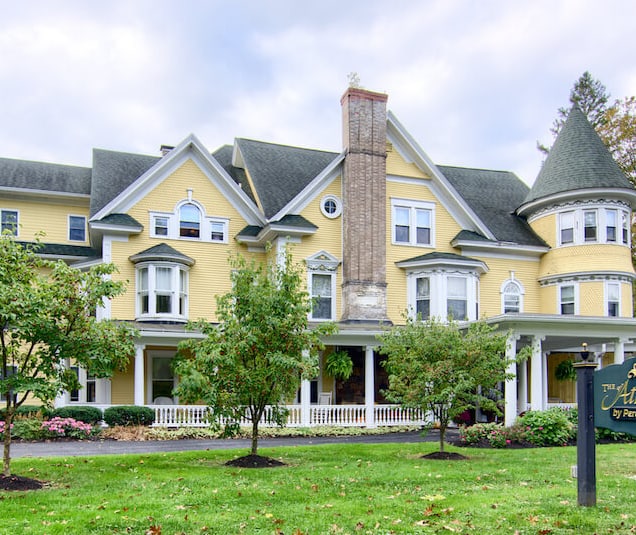Determining the right time to transition a loved one to assisted living can be an emotional and challenging decision.
Balancing their independence with safety and quality of life requires careful consideration. It may be time to consider assisted living when your loved one’s health and mobility are declining and if they’re having difficulty performing daily tasks. An assisted living community can also promote social interaction and prevent feelings of loneliness and isolation. As a caregiver, assisted living can also help prevent you from caregiver burnout.
What Is Assisted Living?
Assisted living communities are designed to support older adults who need help with daily activities. These communities focus on more than just basic needs, offering a blend of independence, support, and social opportunities. Residents typically have private or semi-private apartments, access to on-site healthcare services, and social activities to enhance their overall well-being.
Signs That It May Be Time for Assisted Living
Declining Health and Mobility
When your loved one’s health begins to decline, it may be time to consider assisted living. Changes in mobility, frequent falls, and chronic conditions that require monitoring may warrant extra support.
Assisted living communities typically offer medication management, 24-hour care, and emergency call systems available so that your loved one can enjoy life in the community, knowing there is support when they need it.
Difficulty Managing Daily Activities
Struggles with daily activities, such as bathing, dressing, cooking, and cleaning, are significant indicators that assisted living may be needed. These challenges can lead to poor personal hygiene, malnutrition, or unsafe living conditions.
Assisted living communities emphasize promoting independence while providing needed assistance. These communities tailor their approach to each resident to keep your loved ones safe and healthy.
Social Isolation
Social connections play a crucial role in our mental and emotional well-being. If your loved one is experiencing loneliness or isolation, it may be time to explore assisted living.
These communities offer a wide range of activities and social opportunities, encouraging residents to form new friendships and stay engaged. These events and activities encourage personal development, strengthen relationships, and help build a vibrant community.
Caregiver Burnout
Caring for an aging loved one can be physically and emotionally exhausting. If you’re feeling overwhelmed, stressed, or unable to meet your loved one’s needs due to juggling multiple responsibilities, it might be time to consider assisted living. This decision allows you to focus on your relationship with them rather than the demands of caregiving.
Assisted living communities may also have a 24-hour visiting policy, which means you can visit your loved one at any time.

Benefits of Assisted Living
Assisted living is specifically designed to enhance independence and elevate the daily lives of the residents. In addition to comprehensive, compassionate care, the benefits of assisted living include:
- Enhanced Safety and Security: Emergency call systems, fall prevention measures, and 24/7 support help ensure your loved one receives immediate assistance when needed.
- Access to Healthcare Services: Routine medical care, medication management, and therapy services help provide peace of mind for residents and their families.
- Nutritious Meals and Dietary Support: Meals are tailored to residents’ dietary needs, ensuring they receive the necessary nutrients to support their overall health and energy.
- Opportunities for Socialization: Regular activities, outings, and events help residents stay active and engaged to reduce feelings of loneliness and maintain overall well-being.
- Freedom and Independence: Residents can choose how to spend their time, what hobbies to pursue, and which activities to participate in.
How to Approach the Conversation
It can be difficult to discuss the transition to assisted living with a loved one. Here are some tips to help you address the topic with empathy and understanding:
- Start Early: Begin discussing the possibility of assisted living before it becomes a necessity. This allows your loved one to express their preferences and feel more in control of the decision.
- Listen Actively: Encourage open communication and listen to their concerns and desires. Validate their feelings and involve them in the decision-making process.
- Highlight the Benefits: Highlight the way assisted living focuses on improving safety, offering social opportunities, and providing access to healthcare. Reassure them that you’re prioritizing their well-being and quality of life.
- Tour Facilities Together: Visit potential communities together to allow your loved one to observe the environment and interact with staff and residents. This can help alleviate concerns and provide a sense of familiarity.
Thinking About Assisted Living?
Deciding when assisted living is needed requires careful consideration of your loved one’s health, lifestyle, and personal preferences. By recognizing the signs, understanding the benefits, and approaching the conversation with empathy, you can make the transition smoother and more positive for everyone involved.
For more information on assisted living, please contact our team at The Athenaeum of Skaneateles. Our assisted living lifestyle can help enhance your loved one’s independence while providing care tailored to their needs.









Dining at our community is about more than what’s on the plate—it’s about connection, community, and the joy of gathering together.
Our talented culinary team crafts meals that are both delicious and nutritious, offering flavors that comfort and inspire.
From themed dinners to chef demonstrations, each meal becomes an opportunity to savor the moment and celebrate life’s simple pleasures. 🍴
peregrineathenaeum.com/ ... See MoreSee Less
0 CommentsComment on Facebook
Who’s Who Wednesday…
I would like to introduce Nicole, our new Dining Director. Nicole started in January. It has been a joy to work with her so far. Be sure to introduce yourself when you visit our community.
A little about Nicole:
-Her first job was at a family owned Italian restaurant in Little Italy, Manhattan.
-Hobbies include cooking, fishing, hiking and gardening.
-Her favorite food is sushi and her favorite food to cook is anything with fresh pasta.
-An interesting fact about Nicole, she lived in Hawaii for two years.
We have enjoyed her thoughtfulness and creativity in the kitchen. A few pics to show some of her talent. Welcome Nicole! ... See MoreSee Less
0 CommentsComment on Facebook
Today we celebrate the caregivers—those whose quiet strength and unwavering compassion bring comfort to so many.
We see the difference caregivers make every day: holding a hand, sharing a smile, or offering reassurance when it’s needed most. 💕
Your dedication reminds us that true care goes beyond tasks—it’s an act of love, patience, and humanity.
Thank you for all you do to make the world a more compassionate place.
peregrineathenaeum.com/ ... See MoreSee Less
0 CommentsComment on Facebook
Mardi Gras fun! Kings Cake, beads and stories of New Orleans. ... See MoreSee Less
0 CommentsComment on Facebook
My Valentines on Valentines! 💌 ... See MoreSee Less
0 CommentsComment on Facebook
Happy Valentine’s Day! ❤️
Love takes many forms—between partners, friends, families, and even across generations.
Today we celebrate the love that fills our community: the care shared between residents and team members, the laughter that brightens our halls, and the sense of belonging that reminds us we’re never alone.
May your day be filled with connection, warmth, and heart.
peregrineathenaeum.com/ ... See MoreSee Less
0 CommentsComment on Facebook
In recognition of Mailman Appreciation Day, we thank all our postal service employees for all you do. We are grateful for you! ... See MoreSee Less
0 CommentsComment on Facebook